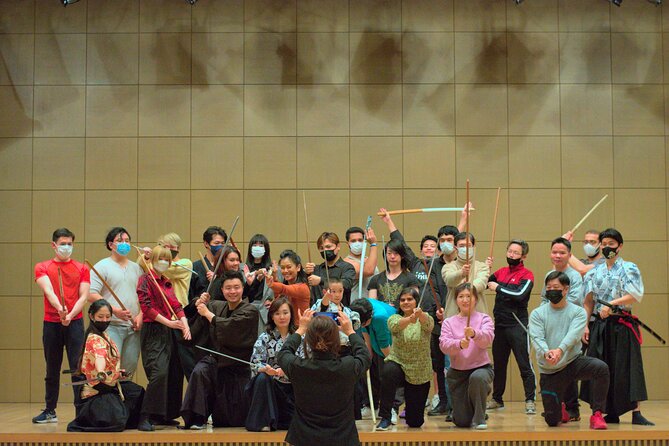Step into the captivating world of the Samurai with the immersive ‘SAMURAI Workshop: Journey to the Spirit of the Samurai’.
Led by knowledgeable guides, you will delve into the fascinating history, unique martial arts, and profound mindset of these legendary warriors.
From mastering swordsmanship to embodying principles of discipline and honor, this enlightening workshop promises an empowering cultural encounter.
Whether a history enthusiast or martial arts practitioner, join us on this transformative journey of self-discovery and unlock the secrets of the Samurai.
Quick Takeaways

- The activity has a designated start time and it is important to arrive on time. Late arrivals may not be able to join the activity.
- The activity ends at the meeting point and you will return to the starting location. The end point may vary depending on the activity.
- It is important to follow the instructions of the guide or organizer and confirm the end point before the activity begins.
- Pregnant travelers, those with heart problems or serious medical conditions, and those with back problems are not recommended to participate. Participants should have a moderate physical fitness level.
History of the Samurai

The History of the Samurai dates back to feudal Japan. These skilled warriors were known for their loyalty, discipline, and mastery of the sword. Samurai lived by a strict code of honor called Bushido, which emphasized loyalty, courage, and self-discipline. They dedicated their lives to the service of their lords and were often seen as the epitome of nobility and chivalry.
Samurai were trained in various martial arts and were expert swordsmen. They participated in numerous battles throughout history, some of which have become legendary. One such famous samurai battle is the Battle of Sekigahara, which took place in 1600 and marked the beginning of the Tokugawa shogunate. Another notable battle is the Battle of Nagashino in 1575, where samurai warriors successfully defended against a massive cavalry charge.
The lifestyle of the samurai was one of discipline, loyalty, and constant training, making them formidable warriors in feudal Japan.
Here's some other great tours and experiences that we think you'll like.
Samurai Code of Conduct
Carrying on from the previous subtopic on the History of the Samurai, an essential aspect of their way of life was the adherence to a strict code of conduct known as Bushido.
The samurai code of conduct encompassed the principles of samurai ethics and honor. It governed every aspect of a samurai’s life, from their behavior on the battlefield to their interactions with others in society.
Central to this code was the concept of samurai honor, which emphasized loyalty, courage, and integrity. Samurai were expected to exhibit unwavering loyalty to their lord, to face adversity with bravery, and to always act with honesty and integrity.
The code of Bushido shaped the samurai’s identity and set them apart as the epitome of honor and discipline in feudal Japan.
Samurai Training Techniques

Continuing from the previous subtopic on the Samurai Code of Conduct, exploring their way of life and principles, we now delve into the Samurai Training Techniques.
The path of the samurai wasn’t just about mastering the art of the sword, but also about developing the mind and spirit. Samurai meditation techniques played a crucial role in their training. Through meditation, they aimed to cultivate focus, discipline, and inner peace, enabling them to face any challenge with a calm and composed mind.
Along With meditation, samurai swordsmanship training was a fundamental aspect of their development. They honed their skills through rigorous practice, perfecting their techniques and mastering the art of combat.
Samurai Weapons and Armor

Samurai warriors trained extensively in the use of various weapons and wore distinctive armor for protection in battle. The weapons of a samurai were carefully chosen and mastered through years of practice. Some of the most common weapons used by samurai included the katana, a curved, single-edged sword renowned for its sharpness and elegance; the wakizashi, a shorter sword used for close combat and as a backup weapon; and the yari, a spear that allowed the samurai to keep enemies at a distance.
Samurai armor, known as ‘yoroi,’ was designed to provide maximum protection while allowing for mobility. Made of a combination of metal plates and leather, the armor covered the samurai’s body from head to toe, protecting them from both arrows and sword strikes. The helmet, known as ‘kabuto,’ was an important part of the armor, often adorned with elaborate crests and designs.
The Philosophy of Bushido

The essence of Bushido lies in the unwavering commitment to honor, integrity, and loyalty. Bushido, the philosophy of honor, encompasses the values and principles that governed the samurai way of life. At the core of this philosophy is the belief in upholding one’s word, fulfilling obligations, and demonstrating unwavering loyalty to one’s lord.
The warrior mindset of Bushido emphasizes the importance of self-discipline, self-control, and the pursuit of excellence in all endeavors. It’s a philosophy that instills a sense of duty and responsibility, guiding samurai to always act in accordance with ethical principles.
Through the philosophy of Bushido, samurai warriors sought to maintain their personal integrity, protect their honor, and uphold their duty to society.
Modern Applications of Samurai Principles

The application of samurai principles in modern society involves adapting the values and ideals of Bushido to contemporary challenges and situations. In the modern workplace, the integration of martial arts principles can be a powerful tool for personal and professional development. Here are two key ways in which samurai principles can be applied in today’s world:
-
Ethical Leadership:
- Emphasizing integrity, honor, and loyalty can inspire leaders to make ethical decisions and create a positive work environment.
- Encouraging leaders to lead by example, showing respect for others, and fostering a sense of teamwork and collaboration.
-
Personal Growth and Resilience:
- The discipline and focus cultivated through martial arts can be applied to personal development, helping individuals overcome obstacles and achieve their goals.
- Learning to embrace failure as an opportunity for growth and developing mental fortitude to persevere in the face of adversity.
Here's some more great Japan experiences nearby that we think you'll like.
Frequently Asked Questions

Is Transportation Provided to the Meeting Point for the Activity?
Transportation to the meeting point for the activity is not provided. Participants are responsible for arranging their own transportation. The meeting point is conveniently located near public transportation options for easy access.
Are There Any Age Restrictions for Participating in the Activity?
Age restrictions and safety guidelines will be provided for participants in the activity. It is important to follow the guidelines to ensure a safe and enjoyable experience. More information can be found on the booking page.
Can Participants Bring Their Own Weapons or Armor for the Workshop?
Participants are not allowed to bring their own weapons or armor for the workshop. All necessary equipment will be provided by the organizers to ensure a safe and authentic experience.
Are There Any Specific Clothing Requirements for the Activity?
The activity has specific clothing requirements and a dress code. Participants should come prepared in appropriate attire. It is important to follow the guidelines provided by the guide or organizer for a successful experience.
Is There a Minimum Number of Participants Required for the Workshop to Take Place?
The workshop requires a minimum number of participants, ensuring a dynamic and interactive experience. Small group sizes allow for personalized attention, fostering a deeper understanding of the Samurai spirit and techniques.
The Sum Up

To sum it up, the ‘SAMURAI Workshop: Journey to the Spirit of the Samurai’ offers an immersive and enlightening experience for participants.
By delving into the history, code of conduct, training techniques, and philosophy of the Samurai, attendees gain a deeper understanding of these legendary warriors.
This workshop provides a unique opportunity to step into the shoes of the Samurai, learn their martial arts, and embrace their principles of discipline and honor.
Whether a history enthusiast or martial arts practitioner, this transformative journey of self-discovery isn’t to be missed.
Where To Stay In Tokyo
Tokyo visitor levels are currently at an all-time high so make sure to book your hotels early. Tip most hotels booked with booking.com have free cancelation so book as soon as you know your date and you can always cancel if you change your mind.





